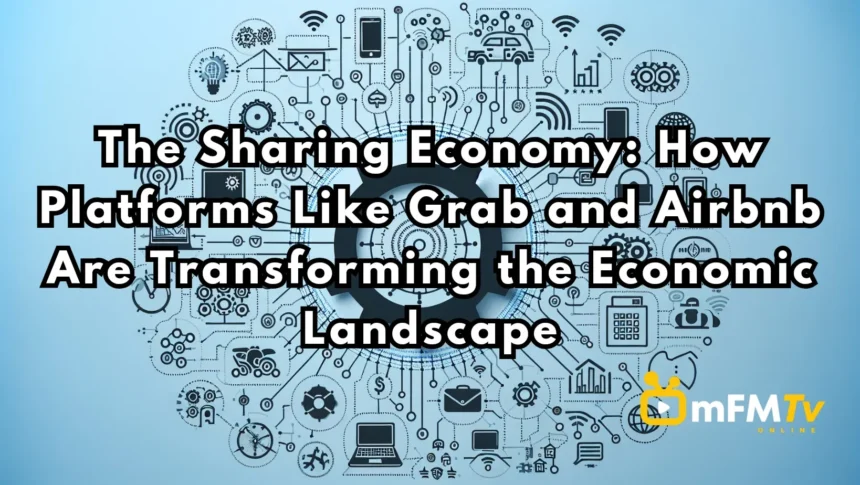In recent years, the sharing economy has emerged as a transformative force in global markets, reshaping the way individuals access goods and services. Platforms like Grab, Airbnb, and many others are at the forefront of this phenomenon, leveraging technology to connect users and service providers directly. This article explores how these platforms are transforming traditional economic structures and creating new opportunities while also presenting unique challenges.
What Is the Sharing Economy?
The sharing economy, also known as the peer-to-peer economy, refers to economic models where goods and services are shared or rented directly between individuals, typically facilitated by digital platforms. Instead of owning assets, individuals can share underutilized resources, such as cars, homes, or skills, creating a more efficient utilization of resources.
Key characteristics of the sharing economy include:
- Technology-Driven: Platforms use apps and websites to connect users.
- Peer-to-Peer Transactions: Bypasses traditional intermediaries like companies.
- Flexibility: Enables on-demand access to services and resources.
How Platforms Like Grab and Airbnb Work
1. Grab: Redefining Urban Mobility
Grab, a Southeast Asian super app, began as a ride-hailing platform but has since expanded into food delivery, parcel services, and financial technology.
- Ride-Hailing: Connects drivers (service providers) with passengers.
- Flexibility for Drivers: Allows individuals to earn income using their vehicles.
- Convenience for Users: On-demand rides at competitive prices.
Grab has revolutionized urban transport by reducing dependency on traditional taxi services and offering a more accessible and seamless user experience.
2. Airbnb: Revolutionizing Hospitality
Airbnb connects travelers with hosts offering short-term stays in their homes, providing an alternative to traditional hotels.
- Asset Monetization: Homeowners can earn money from unused spaces.
- Cultural Exchange: Travelers experience local living and culture.
- Cost Efficiency: Often cheaper than hotels, with diverse accommodation options.
Airbnb’s model has democratized hospitality, enabling anyone with extra space to participate in the tourism economy.
Economic Impacts of the Sharing Economy
1. Job Creation and Income Opportunities
Platforms like Grab and Airbnb have created new income streams for millions.
- Gig Workers: Individuals can work as drivers, delivery personnel, or hosts, offering flexibility and supplemental income.
- Micro-Entrepreneurship: Homeowners and drivers can monetize existing assets.
2. Disruption of Traditional Industries
The sharing economy has disrupted industries like transport, hospitality, and logistics.
- Taxis and Hotels: Ride-hailing platforms have reduced demand for traditional taxis, while Airbnb has impacted hotel occupancy rates.
- Logistics and Food Delivery: Services like GrabFood have transformed how people consume food and shop.
3. Enhanced Resource Utilization
By promoting sharing, these platforms reduce the underutilization of resources, such as vehicles or vacant properties. This efficiency benefits both the economy and the environment.
Challenges of the Sharing Economy
1. Regulatory Issues
Platforms often face regulatory hurdles as governments struggle to categorize and govern their activities.
- Ride-Hailing Regulations: Taxi operators argue that platforms like Grab enjoy unfair advantages.
- Short-Term Rentals: Airbnb hosts in some cities face restrictions due to housing shortages and community concerns.
2. Worker Rights and Benefits
Gig workers often lack access to traditional employment benefits like health insurance, paid leave, or job security. The debate over whether they should be classified as employees or independent contractors continues globally.
3. Market Saturation and Competition
With the proliferation of sharing platforms, market saturation is becoming a concern. Increased competition among drivers, hosts, and service providers can drive earnings down.
The Future of the Sharing Economy
The sharing economy will likely continue to evolve, with these key trends shaping its future:
- Sustainability Focus: Platforms may adopt greener practices to align with global sustainability goals.
- Integration of AI and Automation: Enhanced algorithms will improve matchmaking between users and providers.
- Expansion into New Sectors: Sharing models may extend to industries like healthcare, education, and finance.
Governments and regulators will also play a critical role in balancing innovation with fairness and safety for participants.
Conclusion
The sharing economy, spearheaded by platforms like Grab and Airbnb, has revolutionized how people access goods and services. It has created opportunities for micro-entrepreneurs, increased resource efficiency, and challenged traditional industries. However, its growth also raises significant regulatory and social questions.
As the sharing economy continues to expand, stakeholders must collaborate to address challenges, ensuring that its benefits are distributed equitably and sustainably. Ultimately, the sharing economy represents a shift towards a more connected, flexible, and resource-efficient world.




